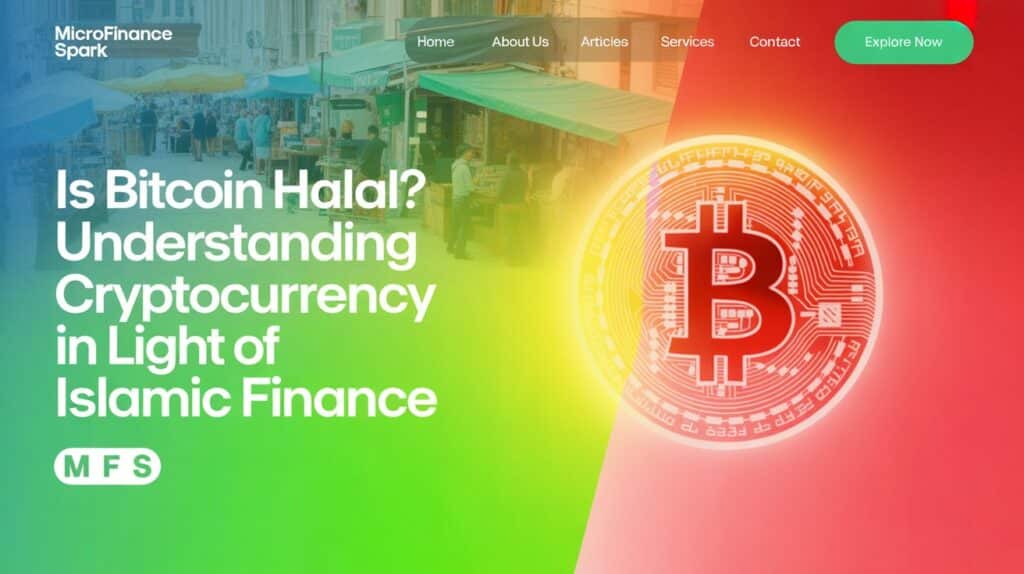The issue of whether investing in or using Bitcoin and its altcoins would be Halal or Haram has become the hot topic of discussion among Muslims. On the question of being Halal or Haram, there are many different opinions being discussed.
The complexity of these questions requires deep insight into Islamic finance, Shariah principles, and actual working of digital currencies. In this article, I will examine the question using a Qur’anic verse, Hadith, scholarly opinion, and application.
Is Bitcoin Halal? Understanding Cryptocurrency in Light of Islamic Finance
Bitcoin and cryptocurrencies are all the rage in this world, but the key question for Muslims is: Is it Halal or not?
To get an answer that really distinguishes them when it comes to cryptocurrencies will require focusing on all of the Shariah principles, along with financial ethics and the realities of the technology involved.
We will explore the Koran, scholarly opinions, case studies, and lessons learned as we analyze the intersection between cryptocurrencies and Islamic law. We intend to leave you assured, within the bounds of faith and facts.
Must Read: Are Memecoins Halal? The Truth About $TRUMP Coin, Dogecoin, and Other Memecoins
Is Bitcoin Halal? A Detailed Analysis through Islamic Principles
When trying to see the permissibility of Bitcoin, Islamic law underscores certain essential principles:
Riba (Usury/Interest)
Bitcoin transactions inherently avoid interest. Unless someone loans Bitcoin with interest expectations, riba isn’t involved. That checks one major box for Shariah compliance.
Gharar (Uncertainty/Speculation)
Gharar refers to excessive ambiguity. That wisdom states that since the value of Bitcoin is so extremely volatile, it can at best be classified as highly speculative.
However, scholars often allow goods that are highly volatile, like gold or oil, provided that the buyer knows the risks. That gives some leeway for cautious and informed investments in crypto.
Maysir (Gambling)
Someone buying Bitcoin with hope for quick windfall profits may resemble gambling (maysir). Islamic teachings discourage gambling as long as there is sincerity and informed consent in the transaction.
Tangible Backing & Intrinsic Value
The Qur’an emphasizes justice and fairness, not necessarily tangible assets. For instance, Allah says:
“O you who believe! Do not consume one another’s wealth unjustly (by riba)…”
(Surah An-Nisa 4:29, meaning provided)
Even though Bitcoin lacks physical form, it serves as a medium of exchange, much like digital bank entries—accepted under Islamic finance if used ethically.
Shariah Verdicts on Bitcoin: Permissible or Prohibited?
Islamic scholars offer various perspectives on Bitcoin:
Mufti Taqi Usmani (Pakistan): He expressed worries regarding the absence of material support and excessive speculation, arguing that Bitcoin is primarily non-compliant unless regulation and stabilization occur.
Dr. Ali Özkök (Turkey): The process of blockchain transaction verification can substitute physical proof, making Bitcoin permissible under certain conditions.
AAOIFI standards: Digital currencies are classified as intangible assets under the Accounting and Auditing Organization for Islamic Financial Institutions.. Their use is allowed if they avoid interest, deception, and speculation.
Crypto Assets and Islam: Exploring a Financial Revolution
Let’s walk through some real-life scenarios:
Personal Success Story
Ahmed, a software developer in Dubai, invested early in Bitcoin, used risk management, and accepted losses. He reports:
“I consider Bitcoin a high-risk, high-reward startup investment.” His methodology goes with Islamic ethical standards of investment as it is free from riba and maysir.
Institutional Adoption
In 2024, a halal financial startup released an Islamic-compliant Sharia Crypto Wallet.
They required full identity checks, implemented educational controls, and avoided speculative token listings. This model illustrates how crypto services can align with Islamic ethics.
Statistical Insight
According to the 2025 “Global Islamic Finance Report,” approximately 15% of Muslim investors now own some form of crypto—showing growing acceptance when ethical structures are present.
Bitcoin in Shariah Context: Key Factors to Reflect On
When evaluating Bitcoin through Islamic law, keep these six points in mind:
- Legal Ownership – Who truly owns the coins?
- Purity of Funds – Are they free from interest or illicit activities?
- Volatility Awareness – Are you ready for sharp price swings?
- Intention (Niyyah) – Are you investing or speculating?
- Compliance Controls – Does your platform prevent misuse?
- Scholarly Consent – Is a qualified Shariah board involved?
🧭 Final Takeaway
Is Bitcoin Halal? The answer: it depends. If you:
- Stay away from interest, excessive speculation, and gambling.
- Use credible, regulated platforms.
- Invest with clear ethical intentions and awareness of risks
then cryptocurrency can be aligned with Islamic finance principles. But if trading becomes a lottery or dives into shady schemes—it strays into Haram territory.
✅ Practical Guidance for Muslim Investors
| Step | Action | Why It Matters |
| 1 | Use wallets with KYC/AML controls | Ensures ethical use & prevents illicit funding |
| 2 | Treat investment like a startup | Limits exposure, curbs gambling temptation |
| 3 | Work with Shariah-compliant services | Adds scholarly oversight |
| 4 | Track your intent | Keeps investments sincere, not speculative |
| 5 | Stick to strong risk management | Avoids major losses |
Closing Thought
Seeking clarity?One must trust an Islamic finance scholar to know his view on what is your unique situation.
Bitcoin is not clear-cut in Islamic law and can be ethically and responsibly used with sound practices.
With time and technology, it becomes increasingly necessary for us to merge innovation with time-honored values.
Halal Crypto: What Lies Ahead in the Digital Age
The lift that halal crypto is providing is a new chapter in which Islam takes economic participation as a major trend in this technological and communications revolution that is certainly reshaping global finance.
With millions of Muslims looking to invest ethically, demand for ethical Sharia-compliant cryptocurrencies has skyrocketed.
Certainly, the ambit between modern technology and the sacred tradition is a bumpy road for companies that provide them, particularly in crafting innovation bridges with tradition.
There are also several Islamic fintech startups that have launched Halal blockchain platforms focusing on transparency, fair contracts, and utility in the real world.
Such as HAQQ Network and Islamic Coin, both claim to provide their services completely within Islamic guidelines, using Shariah boards to oversee smart contracts and asset usage.
In the Qur’an, Allah says:
“Do not consume one another’s wealth unjustly, or send them away in partiality for processing of the wealth.”-(Al-Baqarah 2:188)
The verse is about ethical financing, and it is the basis on which any digital currency must function.
By the proper use of Halal crypto, however, one could possibly drive the inclusion of faith in the economic prosperity of the Muslim world.
Crypto Basics: Is Digital Money Islamically Permissible?
Let’s break down a common question: Is digital money Islamically permissible?
On its own, digital money isn’t problematic in Islamic law. In fact, most of the world’s currency already exists in digital form—your debit card, bank apps, or e-wallets.
What matters is how it’s earned, used, and whether it avoids:
- Interest (riba)
- Fraud (gharar)
- Gambling (maysir)
In the case that such currency is a means of exchange, keeps value and also transfers goods agreeing with the Islamic ethical standard, its use may be accepted. The Prophet Muhammad ﷺ has said that,
“The honest and trustworthy merchant will be with the Prophets, the truthful, and the martyrs.”
(Tirmidhi, Hadith 1209) This Hadith speaks of ethical business behavior and would also serve those using digital currencies for halal transactions.
Overview of Cryptocurrency
Cryptocurrency is essentially decentralized digital money and this, as again, operates on blockchain technology.
It is neither being issued by governments or banks, relying instead on peer-to-peer networks, with cryptographic proof as a method of assuring transaction integrity; this is the opposite of central control.
Here are a few common types:
- Bitcoin (BTC) –Known mostly as “digital gold;” it is the first type of cryptocurrency.
- Ethereum (ETH) –The second most known cryptocurrency platform and avenue for decentralized applications and smart contracts. .
- Stablecoins (e.g., USDT, USDC) –- Pegged to traditional fiat currencies, like the USD.
In an artificial Econocrum—a virtual world that doesn’t support the direct use of the real currency—these are avoided because it diminishes all costs, raises transparency, and allows poorer communities access to records and, at times, gives financial opportunity to do banking business, most of these being in Islamic countries.
Key Traits of Cryptocurrency
Let’s look at the defining features of cryptocurrency, which shape its Islamic assessment:
| Trait | Description | Islamic Relevance |
| Decentralization | No central authority like a bank or government | Reduces chances of manipulation or injustice |
| Anonymity | Users can trade without revealing identity | Raises concerns about money laundering or unethical use |
| Volatility | Prices can rise/fall rapidly | Must avoid gambling-like behavior |
| Transparency (Blockchain) | Every transaction is recorded publicly | Aligns with Islamic principles of honesty |
| Scarcity | Most cryptocurrencies have limited supply (e.g., 21 million BTC) | Promotes value stability, like gold |
These indicators can act as levers for moral intervention through which cryptocurrency can quite frankly prove an effective financial justice and inclusion tool valued within the spirit of Shariah.
Islamic Perspectives on Cryptocurrency Legality
Islamic scholars agree on the division but they often argue around five major points:
Nature of the Asset
Some scholars see crypto as a valuable digital commodity, others call it intangible and speculative.
Market Use
If it’s used in legal, Shariah-compliant trade, scholars are more accepting.
Purpose of Transaction
Intention matters. Is it investment or gambling? Profit-seeking is Halal; gambling is not.
Regulatory Oversight
Some scholars demand state-level regulation. Others say Shariah boards within crypto projects can suffice.
Public Benefit (Maslaha)
There is a possibility that crypto brings financial inclusion, transparency, and fair opportunity, and thus cryptos in essence do serve Islamic finance goals.
Scholarly Verdict Snapshot:
| Scholar/Body | Opinion on Crypto |
| Mufti Faraz Adam (UK) | Permissible with conditions |
| Majma’ al-Fiqh al-Islami (OIC) | Still under review, caution urged |
| Darul Uloom Deoband (India) | Prohibited unless heavily regulated |
| AAOIFI (Bahrain) | Encourages case-by-case analysis |
Views of Islamic Scholars on Digital Currency
Islamic scholars are deeply divided on digital currency:
⚖️ Scholars Who Consider It Haram
Shaykh Haitham Al‑Haddad criticizes Bitcoin for lacking central authority, being unbacked, and its susceptibility to illicit use—making it Haram.
Mufti Shawki Allam, Egypt’s Grand Mufti, echoes these concerns—high uncertainty, lack of approved status, and ties to money laundering justify prohibition
Mufti Muhammad Taqi Usmani, a top Pakistani scholar, labels cryptocurrencies as speculative, “imaginary numbers,” unfit as currency, and often tools for gambling or fraud.
✅ Scholars Who Deem It Halal
Mufti Faraz Adam (UK) sees crypto as Māl (wealth), stressing that tokens with legal utility can be Shariah‑compliant—though he warns against futures and speculation
Dr. Mohamed Ali El Gari and Dr. Mohd Daud Bakar view Bitcoin as permissible—it meets Shariah definitions of Māl, despite lacking physical backing.
Societal acceptance can give legitimacy to a currency even if it does not possess intrinsic value so long as volatility is managed, in the words of Dr. Ziyaad Mahomed of HSBC Amanah Malaysia.
🕊️ Neutral / Conditional
Scholars like Monzer Kahf and Ahmed Kamel Mydin Meera call for caution: crypto may meet money criteria if used on the spot and without leverage—but its volatility still raises gharar concerns
Blockchain Technology and Compliance with Islamic Finance
The backbone of cryptocurrencies, blockchain, drives transparency and security-aligned Islamic finance values with all transactions being publicly recorded and thus, reducing fraud and gharar as considered in the ideology of integrity and accountability in Islam-
However, Islamic scholars say: If it promotes piracy and speculation, it cannot be used because it would be against Shariahism.
Some innovation is taking place on the hammock, developing Halal blockchain platforms for smart contracts for profit sharing or mudarabah- merging the modern financial landscape with Islamic financial principles.
Is Crypto Halal or Haram? Commercial and Ethical Aspects
🔍 Commercial Angle
- If crypto functions as a spot trade medium, avoids riba, and doesn’t involve leverage, it’s often seen as Halal.
- But short-term speculation and trading resembling gambling cross into Haram territory.
🌍 Ethical Considerations
- Ethical use adheres to intentions—are you investing in real projects or jumping in for quick gains?
- Crypto tied to illicit activities—terror funding, money laundering—is clearly unacceptable (Haram).
- Projects built on ethics, transparency, and community benefit can be aligned with Shariah goals.
Role of Shacklewell Lane Mosque in the Crypto Debate
Shacklewell Lane Mosque inaugurated the era of crypto donations in the year 2018, in London. This points to pragmatic tolerance – if the crypto is transparent, ethically donated, verifiable, it can be good.
Not alone in this arena are they. Some organizations are piloting Islamic crypto wallets, with a major focus on KYC/AML procedures, smart contract oversight, as well as community scrutiny to ensure compliance with the laws of the land and accountability.
Shariah Challenges: Digital Currency and Illicit Use
Key Shariah concerns around crypto misuse include:
Anonymity: Helps hide identity, enabling illegal trades—runs against Islamic ethics of transparency.
Lack of Regulation: With no central oversight, users lack protection—Islam favors regulated, lawful trade.
Volatility: Extreme price swings encourage speculative behavior and maysir, a clear violation
Crypto vs. Fiat: Islamic law typically requires tangible backing or state sanction; many scholars argue digital-only tokens don’t fit conventional definitions
🧭 Moving Forward: How to Approach Crypto as a Muslim
- Evaluate each asset with a Shariah lens—utility, backing, legal structure.
- Avoid speculation—focus on long-term, asset-backed, transparent projects.
- Ensure platforms have Shariah oversight, KYC/AML, and scholarly review.
- Keep intentions pure (Niyyah)—is your goal ethical investment or quick profit?
Islamic Banking Laws and Risk of Unlawful Transactions
The Islamic banking regulations view Shariah as the foremost criterion and define a transaction as being Haram if it involves any interest (riba), excessive uncertainty (gharar), or other non-Shariah-compliant elements.
For Muslims, at least under this system, the danger arises in the absence of a central regulator: illegal transactions could simply pass under the radar.
For instance:
- Unregulated platforms might process transactions involving gambling, alcohol, or adult content.
- Cryptocurrency wallets can be anonymous, allowing haram profits to mix undetected with halal ones.
The Qur’an warns clearly:
“And do not consume one another’s wealth unjustly or send it [in bribery]…”
(Surah Al-Baqarah 2:188)
This verse emphasizes that even in the digital world, ethical transparency and legal verification must be upheld.
Hence, Islamic banks and fintechs exploring crypto are adopting strict compliance tools, including blockchain-based identity verification and transaction filters.
Ownership Rights in Cryptocurrency Systems
In Islam, ownership (Milkiyyah) must be:
- Clearly defined
- Legally recognized
- Transferable through legitimate contracts
With cryptocurrency, ownership is established via private keys. Whoever holds the key controls the coin. This aligns with Islamic ownership rules if the asset is:
- Earned through lawful means
- Stored securely
- Transferred fairly
However, lost keys, hacks, or technical thefts raise concern. In such cases, there’s no central authority to help reclaim lost assets—potentially violating Islamic expectations of asset protection and dispute resolution.
According to a Hadith:
“Muslims are bound by their conditions, except a condition that makes a halal thing haram or a haram thing halal.”
(Tirmidhi, Hadith 1352)
This emphasizes the need for secure, enforceable, and transparent ownership contracts, even in digital systems.
Using Cryptocurrency as a Trade Medium in Islam
Trade is highly encouraged in Islam. The Prophet Muhammad ﷺ himself was a merchant and praised honest trade. However, for any currency or medium of exchange to be halal, it must meet these conditions:
Widespread Acceptance
Crypto is increasingly accepted for goods and services, especially in tech industries.
Clear Pricing & Terms
Prices in crypto must be defined at the time of transaction to avoid gharar.
Immediate Exchange (Taqabudh)
As with gold or silver, crypto must be transferred immediately—no delay or interest.
Islamic scholars agree: if crypto is used for direct, spot transactions, with full consent and disclosure, it can be permissible.
For example:
A Muslim buys digital artwork and pays in Ethereum, both parties agree on the price and confirm delivery instantly—this resembles a Shariah-compliant trade.
Guiding Principles for Halal Crypto Transactions
To ensure your crypto activity remains Halal, follow these Shariah-based guidelines:
✔️ Do:
- Use regulated and transparent platforms
- Trade real utility tokens, not meme or gambling-based coins
- Pay Zakat on your crypto holdings (if above nisab)
- Seek scholarly advice before entering new DeFi platforms
❌ Avoid:
- Leverage or margin trading (contains riba and gharar)
- Pump-and-dump schemes or influencer scams
- Coins promoting haram services (gambling, alcohol, etc.)
- Mixing crypto with unlawful income sources
As the Prophet ﷺ said:
“Leave that which makes you doubt for that which does not make you doubt.”
(Tirmidhi, Hadith 2518)
This Hadith perfectly fits modern financial behavior—caution and clarity should always guide your crypto moves.
Islamic Contracts and Digital Financial Instruments
Islamic finance contracts—like Mudarabah, Musharakah, and Murabaha—are being adapted to digital platforms through smart contracts. These coded agreements execute automatically once conditions are met, reducing disputes and delays.
Here’s how some are integrating crypto:
| Islamic Contract | Digital Application | Shariah Consideration |
| Mudarabah | Profit-sharing with crypto investors | Must clearly define capital, risk, and return split |
| Murabaha | Asset-based crypto purchases | Price and markup must be disclosed up front |
| Wakalah | Investment agency with digital oversight | Requires honesty and proof of delegation |
| Salam | Prepaid delivery agreements | Can be implemented with escrow smart contracts |
However, coding errors or vague contract terms can lead to gharar, so these platforms need Shariah audits and oversight from Islamic finance scholars.
The Concept of Digital Currency
Busting Myths Around Crypto and Sharia Compliance
Many misunderstandings swirl around crypto and Sharia law. Let’s straighten them out:
Myth: Crypto Is Gambling by Default
Not always. If used responsibly—like buying goods or investing sensibly—it’s a tool, not a casino slot machine.
Myth: All Crypto Is Haram
Wrong. Tokens with real utility, backed by credible projects and avoiding speculative hype, can align with Sharia principles.
Myth: Digital Means Deception
Blockchain’s transparent ledger actually supports honesty—contrary to the suspicion some scholars fear.
Myth: Only Fiat Money Is Acceptable
Islam doesn’t mandate central-bank issuance. During early Islamic history, gold and silver (like the dinar and dirham) were used—and that’s similar to how crypto functions today, digitally.
You will be must like reading: Halal Crypto Screening 2025 | Easy Shariah-Compliant Investment
Oversight, Regulations, and Faith-Based Control
To ensure Sharia compliance, crypto platforms must implement:
Regulatory frameworks—like KYC/AML—to prevent misuse
Shariah boards to vet projects and review tokenomics
Zakat integration—automated on wallets once holdings exceed nisab
The Prophet Muhammad ﷺ emphasized accountability:
“Every one of you is a shepherd and each of you is accountable for his flock.”
(Bukhari, Hadith 7138)
By combining religious oversight and regulatory controls, faith-based crypto becomes not only possible but praiseworthy.
Sharia-Based Review of Cryptocurrency Use
When evaluating crypto through a Shariah lens, scholars typically ask:
- Is the asset defined clearly?
- Does the transaction avoid riba, gharar, and maysir?
- Is it backed by real utility or profit-sharing?
- Are transactions spot-based and immediate?
Platforms like X8-Salam and Wahed Invest adhere to these criteria—they offer profit-sharing tokens and immediate transfer mechanisms under scholarly guidance.
Fatawa and Scholarly Views on Crypto Investments
Now, let’s explore real fatawa (Islamic rulings):
Darul Uloom Deoband (India): declared crypto Haram unless fully regulated; they cited volatility and anonymity as risk factors.
Islamic Fiqh Council of Saudi Arabia: advised extreme caution—no official approval yet; they stressed the need for further in-depth study.
Mufti Abdullah bin Umar (Sri Lanka): issued a conditional ruling—crypto is permissible if used for real business and avoids leverage or speculation. No margin trading, he warned.
Each fatwa demonstrates how scholars weigh benefits, risks, and purpose before declaring permissibility.
Analyzing Opinions: Debates Among Scholars
The academic conversation around crypto shows major differences:
Pro-Western Scholars (like in the UK, Malaysia) often accept crypto with conditions—utility, transparency, and clear purpose.
Traditionalist Scholars (like in Pakistan, India) lean toward caution—preferring fiat regulation and warning against speculative misuse.
Neutral or Investigative Bodies (e.g., OIC’s Majma’ al-Fiqh) are still researching; their focus is on global relevance and consensus.
These debates reflect the dynamic tension between innovation and tradition. Just because crypto is new doesn’t automatically make it Haram—but neither is it unquestionably Halal. Understanding scholarly intentions, context, and evidence is key.
Arguments Against Declaring Crypto as Halal
Many scholars caution against quickly labeling cryptocurrency as halal, citing several critical issues:
High volatility: Rapid price changes resemble gharar (excessive uncertainty), which is prohibited.
Lack of intrinsic value: Some argue cryptocurrencies are not tied to real assets and behave like speculative instruments.
Anonymity and misuse: Platforms allow for money laundering, illegal trades, and haram activities without accountability.
No state backing: Unlike fiat money, crypto isn’t issued or controlled by any government—this raises concerns for some fiqh schools.
In the Qur’an, Allah warns:
“O you who have believed, do not consume one another’s wealth unjustly…”
(Surah An-Nisa 4:29)
This verse highlights the need for clarity and justice in financial dealings—areas where certain cryptos may fall short.
Arguments in Favor of Halal Cryptocurrency
On the other hand, several respected scholars and Islamic economists view cryptocurrency as potentially halal, under certain conditions:
- Meets the functions of money: Cryptos can serve as a medium of exchange, store of value, and unit of account.
- Blockchain transparency: Transactions are publicly recorded, reducing fraud and supporting Islamic values of trust and accountability.
- Decentralization reduces corruption: With no single authority controlling the system, fairness in trade may improve.
- Smart contracts allow for automated Shariah-compliant agreements, such as profit-sharing (Mudarabah) or prepaid contracts (Salam).
One of the Prophet’s ﷺ guiding financial principles was:
“The buyer and the seller have the option (to cancel) as long as they have not separated.”
(Sahih al-Bukhari 2110)
This reflects the emphasis on consent, clarity, and transparency—traits that well-designed crypto systems can uphold.
Ambiguity in Smart Contracts and Islamic Law
Smart contracts, while revolutionary, bring Islamic legal challenges:
- They are written in code, not human language—this may cause ambiguity (gharar) if not audited properly.
- Shariah conditions, like clarity in offer and acceptance (Ijab and Qabul), must still be met—even if automated.
- Terms like deferred delivery, unknown risk, or one-sided advantage can render a smart contract invalid in Islam.
For example: if a smart contract stakes coins in a yield farm without disclosing risk or return clarity, it may fall into haram territory due to uncertainty and possible riba.
That’s why several Shariah-compliant crypto platforms have introduced fatwa-approved smart contract libraries, designed under fiqh supervision.
Interest (Riba) Concerns in Cryptocurrency Deals
Riba (interest) is one of the gravest prohibitions in Islam. It appears in many forms within crypto ecosystems, including:
Margin trading and leverage: Borrowing funds to amplify trades involves interest-based loans.
Lending platforms (DeFi): Some offer fixed returns on crypto deposits—this is riba al-nasi’ah (delayed interest).
Staking rewards: If not tied to real utility or risk-sharing, rewards may mimic interest.
The Qur’an strictly forbids riba:
“Allah has permitted trade and forbidden interest…”
(Surah Al-Baqarah 2:275)
For a crypto project to be Shariah-compliant, it must avoid any form of guaranteed, fixed returns without effort, work, or risk—only profit-sharing structures like Musharakah or Mudarabah are acceptable.
Crypto Risks: Gambling and Prohibited Activities
One of the most pressing concerns around cryptocurrency is its use in maysir (gambling) and other prohibited activities:
Pump-and-dump schemes: Investors hype up tokens, then sell quickly—resembling classic gambling.
Casino or gaming tokens: Several coins are tied to online gambling platforms—clearly haram in Islam.
Dark web usage: Anonymous tokens like Monero are frequently used in haram trades (drugs, weapons, etc.).
NFT speculation: Buying overpriced digital art with hopes of resale can mimic maysir, especially when no real use exists.
In Islam, gambling is strongly condemned:
“They ask you about wine and gambling. Say, ‘In them is great sin…’”
(Surah Al-Baqarah 2:219)
A responsible Muslim must avoid crypto tokens or platforms that are purely speculative, promote immoral content, or function as gambling tools.
Are Digital Coins Legitimate Islamic Currencies?
Whether digital coins qualify as Islamic currencies depends on several Shariah-based criteria:
Broad Acceptance: A currency must be accepted in trade. While Bitcoin and Ethereum are increasingly used, they’re not yet universally accepted like the Dirham or Dinar in Muslim economies.
Defined Value and Units: Tokens must have clear units (e.g., satoshis) to prevent gharar.
Immediate Ownership Transfer (Taqabudh): Payment and delivery must happen at the same time—possible with crypto, but platforms must support this.
No Inherent Riba or Fraud: The system must not inherently provide interest or hide unethical terms.
If a digital coin meets these conditions and is embraced responsibly, it could function as a legitimate Islamic currency—but regulation, transparency, and widespread acceptance remain essential hurdles.
Valuation Issues of Cryptocurrency in Shariah Law
Assigning value to cryptocurrency under Shariah principles presents several challenges:
- Lack of intrinsic value: Unlike gold or agricultural goods, crypto is intangible and often judged speculative.
- Volatile price swings: Sudden drops or spikes suggest maysir and gharar, which the Shariah strongly forbids.
- Subjective demand: Value driven solely by hype or speculation is precarious.
Islam does permit trade in intangible assets—so long as the coin has a clear function, and both parties understand its market risks. Such transparent, informed trade can be permissible—even if underlying uncertainties exist.
Is Crypto Truly Halal? Ongoing Concerns & Issues
While many argue that crypto is Halal when used ethically, several persistent concerns complicate the debate:
- Market Manipulation: Pump‑and‑dump schemes blur the line between legitimate trade and haram speculation.
- Unregulated DeFi: Projects offering guaranteed returns may mask riba, making them impermissible.
- Blockchain forks: Splitting a chain may involve “receiving free money,” raising legal questions about entitlement and fairness.
- Lack of standardization across platforms makes it hard for consumers to distinguish Halal vs. Haram crypto.
Until regulation and standard Shariah governance become commonplace, using crypto responsibly remains the only safe route.
Legal Regulations and Islamic Compliance
The evolving regulatory landscape plays a crucial role in aligning crypto with Islamic compliance:
- Governments (e.g., UAE, Bahrain) are outlining clear Shariah-compliant crypto laws, ensuring consumer protection and ethical use.
- Fatwa councils are providing conditional rulings—crypto may be Halal if compliant with state or Shariah-based frameworks.
- Islamic fintech firms integrate KYC/AML protocols, clear contract terms, and scholarly oversight within blockchain operations.
This convergence between regulation and religious guidance helps mitigate fraud, speculation, and anonymous misuse, making crypto more trustworthy in Muslim communities.
Digital Currency as a Tradeable Instrument
When used as a trade instrument, digital currency must align with Islamic ethics:
- Spot trades with predefined price, immediate exchange, and full consent are Shariah-friendly.
- Peer-to-peer commerce (like DeFi marketplaces) can be acceptable, provided both parties understand the asset, risks, and receive equal transparency.
- Invoice-backed stablecoins – a rising innovation. These are digital coins tied to real-world assets, allowing trade with lower volatility and higher compliance.
- Tokenized Islamic finance instruments – like sukuk (Islamic bonds) on the blockchain, combining halal investment structures with digital efficiency.
In essence, if a digital currency is used coherently as a spot-traded medium with Shariah supervision, it can operate as a true Islamic financial instrument.
✅ Final Takeaway
Digital currencies aren’t black-or-white in Islamic finance. As long as they:
- Offer clear ownership and value
- Support immediate trade and spot transactions
- Avoid riba, maysir, and gharar
- Operate under regulation and Shariah guidance
…then they hold potential to serve as legitimate, Halal, and innovative tools in Muslim economies—bridging tradition with digital progress.
Market Instability and Faith-Based Investment Risks
Cryptocurrency markets are famously volatile. For many Muslims, this market instability raises serious concerns about the risks involved in faith-based investments:
- Wild price swings create excessive uncertainty (gharar), which Islamic law strictly forbids.
- Sudden crashes can wipe out investments overnight, conflicting with the Islamic principle of preserving wealth.
- Many crypto projects lack transparency or oversight, increasing the chances of fraud or unethical practices.
- This unpredictability can lead investors to behave like gamblers (maysir), chasing quick profits without sound backing.
The Prophet Muhammad ﷺ warned against such recklessness:
“Whoever says to his companion, ‘Come, let us gamble,’ must give charity.”
(Sahih Muslim 1955)
For believers, it’s crucial to balance innovation with caution—prioritizing investments that offer stability, clear value, and ethical foundations.
Crypto Investments under UAE’s Islamic Framework
The United Arab Emirates is pioneering efforts to harmonize cryptocurrency with Islamic finance principles:
- The Dubai Islamic Economy Development Centre (DIEDC) works to establish clear guidelines for Shariah-compliant crypto assets.
- UAE’s regulators require transparency, anti-fraud mechanisms, and risk disclosures to protect Muslim investors.
- Islamic fintech firms in the UAE offer crypto products vetted by Shariah scholars, blending blockchain innovation with religious adherence.
- The framework emphasizes avoiding riba, gharar, and maysir, aligning investments with Qur’anic injunctions.
This progressive approach creates a blueprint for other Muslim-majority countries to follow—offering ethical investment opportunities while embracing the digital age.
Must Read: Halal Crypto Insights — Understanding Digital Currencies in Islam and Beyond
Conclusion
Is Bitcoin Halal? Understanding Cryptocurrency in Light of Islamic Finance requires careful consideration of Shariah principles. While Bitcoin offers transparency and decentralization, concerns like gharar (uncertainty), riba (interest), and misuse remain.
Scholars differ in opinion, highlighting the need for clear regulation and ethical use. Ultimately, Bitcoin can be Halal if traded responsibly, avoids speculation, and follows Islamic financial ethics.
As the digital economy evolves, ongoing dialogue between scholars and experts will shape its rightful place in Islamic finance.

Maria Jolly is an experienced blogger at Micro Finance Spark, passionate about simplifying finance for everyday readers. With a sharp eye on trends in crypto, markets, budgeting, and smart saving, Maria delivers insightful, easy-to-understand content to empower informed financial decisions.






